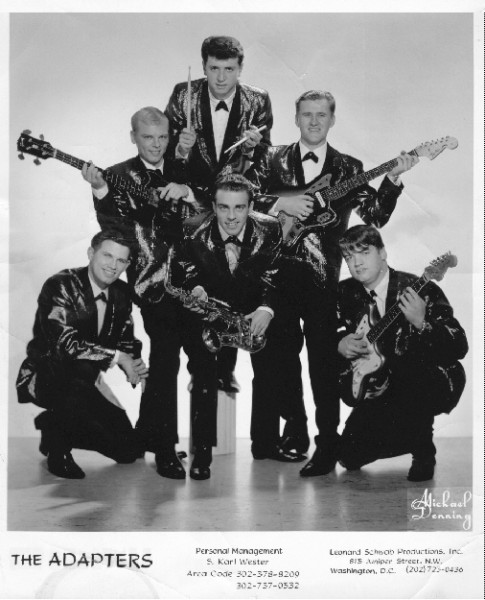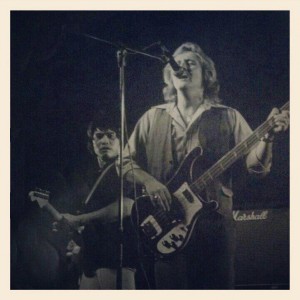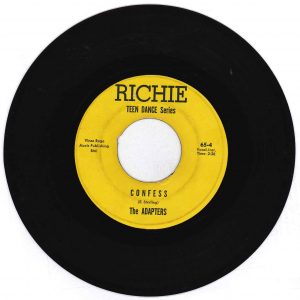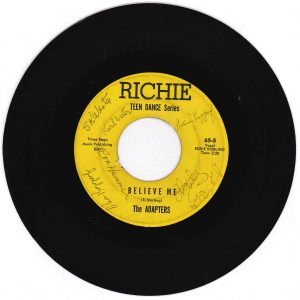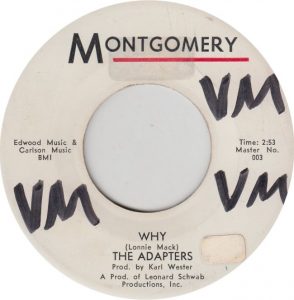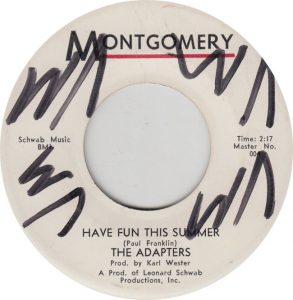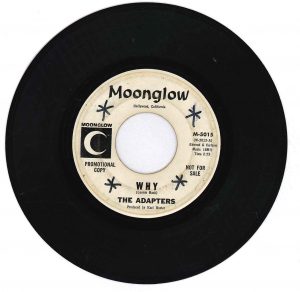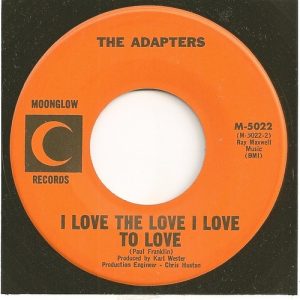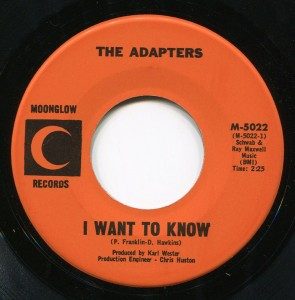Paul Franklin, The Adapters, P.F. & The Flyers
UP THE DELAWARE RIVER TO THE NARRAGANSETT BAY:
PAUL FRANKLIN’S MUSICAL JOURNEY TO THE OCEAN STATE
by Rick Bellaire with Cari Franklin
When music fans throughout southern New England hear the name Paul Franklin, most of them immediately think of the leader of and bass guitarist for the Rhode Island-based P.F. & The Flyers, one of the finest and most successful nightclub/cover bands in the northeast during the 1970s and ’80s.
What most of them don’t know is that before he ever set foot in Rhode Island, Paul had already experienced a successful career in the mid-late 1960s as lead guitarist for a “blue-eyed soul” band which had taken him on an exciting ride to within inches of “the brass ring” near the upper reaches of the music business during one of the most exciting times in popular music history.
THE ADAPTERS
By the time Paul Franklin was born into a musical family in Fairmont, West Virginia in the late 1940s, his older brothers were already working as disc jockeys and gospel music performers in the area. The family moved to Newark, Delaware in 1952 and Paul began studying the guitar at age 12. He developed quickly and by age 13, he was already singing and playing in church. Like most young musicians of his time, regardless of their musical backgrounds, Paul was bitten by the Rock ‘n’ Roll bug and by 1961, he was performing regularly at frat parties and teen dances with his own band.
In the summer of 1964, Paul was offered the lead guitar slot in one of the area’s top bands, The Adapters. Although Newark was, itself, something of a mid-sized market, it’s location in the northeast corridor put it in close proximity to the exciting happenings at the colleges and nightclubs in Philadelphia and nightlife along the New Jersey shore (especially in the summer), not to mention the vibrant scene which had developed around the University of Delaware. Since the summer of 1963, the band had been playing a “Block Party” gig in a parking lot in Newark during the warmer months. Once The Beatles arrived on our shores, however, the teen appetite for Rock ‘n’ Roll grew so quickly and reached such large numbers, that the outdoor gig became impossible to control and the band moved indoors which allowed them to perform year-round and to even more fans.
In 1964, their managers signed a lease for Friday nights at a new banquet facility in town, the Aetna Fire Hall, and things took off like a shot. “The Fire Hall Dance” became an immediate success and The Adapters were soon packing the place to capacity – upwards of 600 kids – every week. At this time, the band had continued to play the Rock ‘n’ Roll and R&B numbers which had become the staples of their shows, but were now introducing the British Invasion hits and the new soul sounds coming out of Stax and Motown into their repertoire as well. Success on this scale could not go unnoticed and in 1965, The Adapters were offered a recording contract with a local label.
Richie Records was the brainchild of local entrepreneur Vincent Rago. The label had experienced a good-sized regional hit in 1961 with “Crying Over You” by R&B doo-wop group Teddy & The Continentals, but was struggling to stay afloat during the onslaught from the English groups and the modern soul sounds coming out of Detroit, Memphis and Philadelphia. The Adapters seemed to fit the bill for success in every way: a young, white Rock ‘n’ Roll band with Rhythm & Blues roots which already had it’s own huge following. Rago had the band cut two original songs written by the their lead singer, Ed Sterling, “Confess” and “Believe Me.” It was the B-side, “Believe Me” which caught the public’s ear. The record was an out-of-the-box smash and shot to #12 on WAMS, the powerful Top 40 station which ruled the AM dial in Delaware at the time. The success of the single allowed the band to expand their territory into the surrounding scenes in Philly and New Jersey and WAMS continued their support by using the group at all their live events. Things were definitely looking up!
That is until singer-songwriter Sterling suddenly decided to quit the group leaving Paul Franklin as the main creative force within the band. They didn’t miss a beat and were soon offered a new deal with Montgomery Records out of Camden, New Jersey. Their next single featured a cover of Lonnie Mack’s “Why” backed with a Paul Franklin original, “Have Fun This Summer.” The A-side, which featured Paul’s heart-wrenching vocal and spooky guitar solo, again took off in the Atlantic states like its predecessor and ruled the local charts in 1966. The band made television appearances in Philadelphia on Jerry Blavat’s Discophonic Scene and on the nationally syndicated Hy Lit Show. The broadcast with Hy Lit helped begin moving the record westward and it was picked up for national distribution by Los Angeles label Moonglow Records, the home of The Righteous Brothers. It charted regionally all over the country and reached #16 in southern California. The band began playing bigger and better venues and appearing in concert as far west as Chicago with headliners such as Mitch Ryder & The Detroit Wheels, Gary Lewis & The Playboys and Freddie & The Dreamers. By the time the record had run its course, the band had a good-sized national hit under its belt with local sales alone reaching the 10,000 mark.
1967 saw the band returning to the studio to record another single for Moonglow, this time featuring two Paul Franklin originals. The A-side, “I Love The Love I Love To Love,” captured the band’s soul sound and its flip, “I Want To Know,” explored the softer side of things along the lines of recent hits by The Association (“Cherish”) and The New Colony Six (“I Will Always Think About You”). Neither side, however, caught on at radio nor with the general public and it became their last release. Business was still good, however and the band continued touring all over the northeast throughout 1968. While playing in Margate City, a resort community five miles south of Atlantic City, The Adapters met the drummer from another band, Richard Carr, who was playing there with a group out of Philadelphia. The two bands played several more engagements near each other and Paul and Ricky became fast friends. With the Adapters’ career winding down, the two musicians decided to join forces and began planning a new band.
THE RICKY CARR CORPORATION
Paul and Adapters keyboardist John Southard made the decision to relocate to Rhode Island to start up the band with their new friend with Paul making the switch to bass guitar as Ricky was bringing in guitarist Doug Mohn. The new group was dubbed “The Ricky Carr Corporation” and they quickly became one of the top club bands in southern New England. By 1970, however, Ricky decided that his future lie behind a desk rather than behind the drum set and he left the group to start a booking agency, Richard Carr Productions.
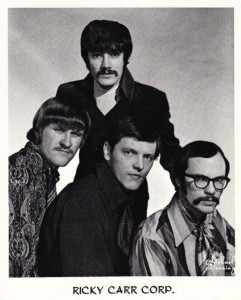
The Corporation 1968: Richard Carr (at top), Paul Franklin, Doug Mohn & John Southard (front, left to right)
P.F. & THE FLYERS
The Corporation quickly regrouped and christened the new lineup “P.F. & The Flyers.” With Richard behind them, they soared to even greater heights on the New England club circuit and remained at the top of that scene for almost twenty years. And although the Flyers concentrated on cover material in order to maintain their status in the top venues, it should be noted that the band was immensely popular and intensely good at what they did.
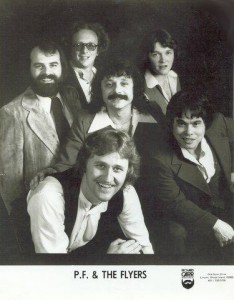
A classic lineup of the Flyers in the 1970s: (left to right) Bruce Gasper, Bob Weigand, Butch Giachelli, Glenn Evans and Poncho Vidal, and (in front) Paul Franklin
For nearly two decades, the Flyers were the highest paid cover band in New England and Paul provided full time employment for over two dozen Flyers during a time when most musicians had to take day jobs to survive. Paul retired the band in 1987, but they regrouped one last time in 1992 for a benefit for longtime Flyers guitarist, the late Poncho Vidal. Also in 1992, Paul returned to the stage joining Tradition, an Irish band out of Boston performing Rock ‘n’ Roll and Country & Western in addition to their Celtic repertoire.
The author would like to thank Paul’s daughter, Cari Franklin, for providing the biographical details on his early career as well as most of the images, and also Paul Franklin and Richard Carr for filling in the blanks.
THE ADAPTERS DISCOGRAPHY
Compiled by Rick Bellaire
Confess b/w Believe Me (Richie Teen Dance Series 65-4/65-5) 1965
Why b/w Have Fun This Summer (Montgomery 004/004) 1966
Why b/w Have Fun This Summer (Moonglow M-5015) 1966
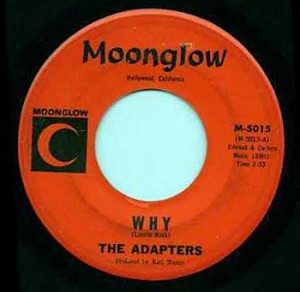
The hit! A stock (or store-bought) copy. The single charted nationally and ultimately sold over 10,000 copies
I Love The Love I Love To Love b/w I Want To Know (Moonglow M-5022) 1967
LINKS & RESOURCES
For more information about The Adapters and the Delaware music scene of the 1960s, visit:
http://hangnailphillips.com/?p=414
For a deeper look into the career of P.F. & The Flyers and including a membership roll, visit New England Musician’s Outlet:
http://nemo-newengland.blogspot.com/2012/11/pf-and-flyers.html
Visit the website of Paul’s current band, Tradition, for upcoming dates in your area:
http://thebandtradition.com
